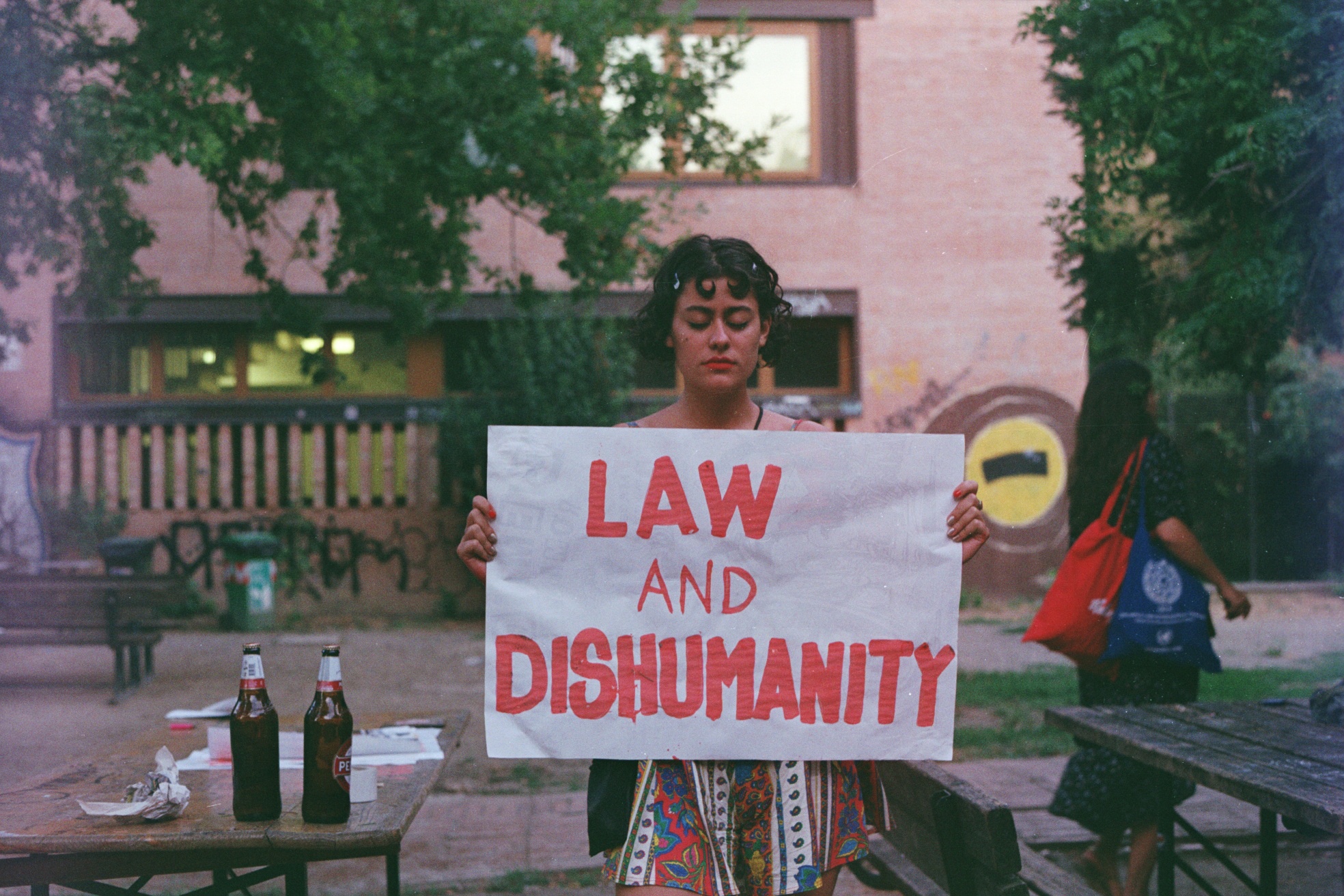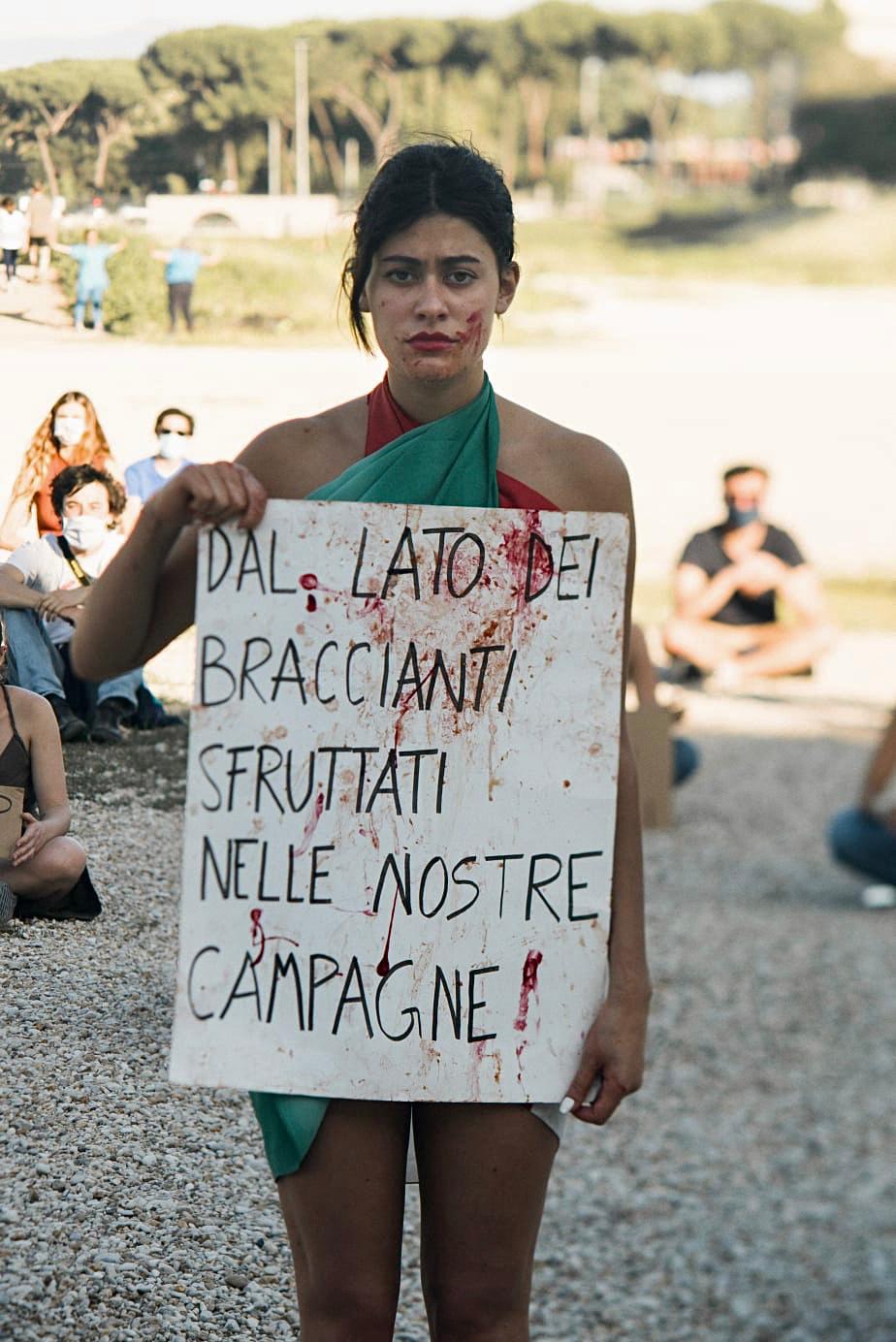The bloody truth behind our food: Diletta Bellotti’s fight against food slavery
You probably love tomatoes, right? Plum, cherry, roma, heirloom and perhaps the most prevalent, tinned tomatoes, are part of our daily lives. They span entire plates, palates and cuisines, they’re everywhere. We’re talking pizzas, pasta, salsas, chutneys, pureés, pastes, soups, curries and, of course, salads to name but a few. They seem to be a central part of our cooking—perhaps even our very lives. However, much like most systems, agriculture cannot escape capitalism, and therefore produce like the beloved tomato does not exist without exploitation. Or more accurately, without blood.
Italy-based activist Diletta Bellotti has been on a mission to reveal the sinister reality behind the world’s most popular fruit. Bellotti has continuously fought to challenge the systems at play and reveal to the masses the truths behind food, consumption and climate justice under capitalism. A vocal advocate for such issues, the revolutionary activist sat down with Screen Shot to share the reality of where our tomatoes come from, what her work entails and how we can all incite revolutionary change.
In an incredibly passionate and insightful TedxTalk titled Welcome to Italy, enjoy your blood-stained food, Bellotti disclosed the horrifying details of the over 100,000 migrant workers currently enslaved to Italy’s agricultural sector—workers who are often unpaid, threatened with death and even raped. Many die. Such a practice occurs as a result of what Bellotti reveals as the “caporalato.”
In a conversation Bellotti had with Cristiano Diprima, the caporalato and its consequences are defined: it is without doubt an illegal form of ‘recruitment’ conducted by a person known as a gangmaster that entails illegally acquiring migrants for farming work. The gangmaster in question enforces absolute control on the lives of the people he ‘employs’, from their pay to their living arrangements, food and transportation. It was witnessing the experience of the lives of migrant workers with her very eyes that changed Bellotti forever, leading her to gracefully share her experience living with these enslaved labourers with us.
“Living conditions in these slums are the worst you could imagine: no hygienic facilities, no drinkable water and [frequent] fires that burn the slums and the people that live in it,” she said, continuing, “The worst part though is that these settlements are evacuated and destroyed by local authorities without giving any real solution.” Her experience with staying in these informal settlements is very complex, she explained in our conversation—acknowledging herself as a white and relatively privileged individual, Bellotti does her best to interact in this world as respectfully as she can.
To that same notion (with many workers heralding from North Africa) I asked Bellotti what role race thus played in the modern day slavery that plagues our plates. “Farm labour is surely racialised and the type of discrimination migrants face when forced into dangerous and unhealthy living conditions is a matter of fact,” she stated. However, to understand the true structure of such violence, intersectionality is key, the activist explained.

“Race, or more properly, ethnicity and migrant-background are to be understood in a context in which what matters is the possibility for someone to exploit a person. This happens to Eastern Europeans as well as Italians, to men and women, adults and minors,” she continued. The integral factor within any exploitation at play, for Bellotti, is whether those at the mercy of such exploitation have any bargaining power—namely, the socio-economic class to which they belong. “The marginalised, the irregular migrants, the outcasts, the poor, are exploited first of all because they ‘fail’ to press charges, or find emancipatory opportunities,” she explained. Thus, Bellotti argues that the essential lenses of intersectionality must be utilised to analyse such social issues—be it gender, class or ethnicity among others.
So, how are the caporalato (gangmasters) able to get away with such horrifying acts of slavery and abuse? Well, according to Bellotti, such examples in Italy simply mirror that of a worldwide structural implementation of exploitation, which comes as a result of not just violent infrastructural corruption and its failures but its horrific normalisation in society. This insurgence of a food Mafia in Italy is therefore a consequence of such institutional errors.
“It is pivotal to understand that the Mafia is first of all the result (and, later, agent) of an institutional vacuum. It is a space that institutions, historically, fail to reach and that is literally occupied by something else, this can be [filled by] mafias as well as excellent examples of community-based organisations,” the activist explained. Basically, when an institution fails to implement a suitable and ethical structure, a vacuum is created where other more dangerous substitutes can take its place. Bellotti uses migration to drive home this point.
“Let’s think about the case of migration: we close the borders and people still migrate and will keep migrating as they always did. The fact that the border is closed just makes it more dangerous to migrate and simply fosters a system of institutional and structural violence that leaves people in precarious situations and easier to be victim of labour exploitation. When institutions fail to acknowledge this simple fact they are, in fact, promoting and relying on the exploitation of people to sustain their economic systems,” she said.

The capitalistic society in which we live provides the perfect soil for such exploitation and structural violence to grow. It spreads farther beyond the borders of Italy. Without the modern enslavement that we know of today, our systems of consumerism and consumption would simply not exist, Bellotti argued. The activist highlighted figures from 2018 which state that over 40 million people (71 per cent of whom are women) were victims to some form of exploitative labour—exploitative labour that we pay for and benefit from.
“The fact that we access fresh and abundant food, as well as cheap and always-new clothes, or order something online and have it delivered in some hours, is based on the exploitation of people. It is ‘natural’ for us to live this way, so we can condone it. So it is not just the agro system, it is everything we consume and we must reform to safeguard people and the planet,” Bellotti noted.
In her phenomenal work as an activist on the ground in Italy, Bellotti could be seen standing in a square holding fruits and vegetables injected with fake blood. The provocative and visceral imagery does its job as she brilliantly encapsulates the murder in our mouths. The message is simple but effective: biting, squeezing and breaking the flesh of a ripe tomato, its ‘blood’ flowing out and staining the Italian flag wrapped around her. “Made in Italy is Made of blood.”

But Bellotti wants to remind you that it isn’t just tomatoes and it isn’t just Italy. “It is absolutely not just tied to the tomato industry, I chose tomatoes as symbols because the picking of tomatoes is throughout the hottest months, and it is easier for farm workers to die under such heat,” she remarked. “It is also just not tied to Italy. Other European countries pass the buck of farm labour exploitation to the countries from which they import food: like Italy, Turkey and Spain. But it is their problem as well, the high demand of food for a cheap price (food that is also often wasted, by the way) creates an unjust supply.”
This in-turn only exacerbates a cycle of enslavement, abundance and waste. Bellotti, in her work, shows that a cheap and often disposable workforce means that other countries that import such produce live in a privileged and disturbing abundance whereby they have the option to actually waste food. But how can we put a stop to such an evil capitalistic cycle? What role can we play?
For Bellotti, she found her meaning in this fight, “I couldn’t act differently, I couldn’t wait or compromise.” However, she understands the position of those who have yet to participate in activism, “People are moved by different things and most don’t engage in advocacy because they aren’t suffering yet themselves… I totally understand it and I honestly don’t judge it.” She believes that those with the compassion and sensitivity to really see it will come around to the movement one day.
The activist also told us that it is because of this that she does not have a large issue with performative activism itself and argues that she would rather see an issue being talked about than not. However, there are two things she does have a problem with—and rightly so. Performative activists “shouldn’t be idolised and they should not take up space (since we are normally talking about white, wealthy and able-bodied people).” She continued, “I [also] do not condone neoliberals appropriating and exploiting sociopolitical struggles. Not just because they don’t belong but because they have no interest in destroying oppressive systems.”

Performative activists have no interest in radical change, we have seen that time and time again. From addressing issues like Black Lives Matter and violence against women to COP26 (and more), we have all bore witness to many a series of perfectly manicured PR stunts and promo but no real change. So what can we do to cut through the bullshit?
“Lots of things can be done, and must be done: local organisations, like Sindacato di strada and Camper dei diritti, should be supported—especially financially. Privileged voices must act as megaphones of the outcasts’ experiences, they should create spaces, moments for them to speak up and organise,” Bellotti clarified. This is particularly vital in this instance, those oppressed and abused by agricultural Mafia systems should be platformed as the leaders of the movements we should support, she suggested.
“On a national side, we must push for a clear understanding of the phenomena and ask institutions to keep working and the general public to support agricultural realities that de facto obstruct agro-criminal systems.”





